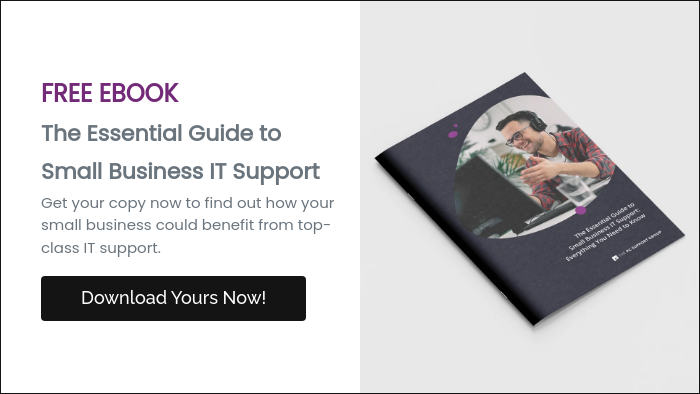
Cloud computing is no longer just for tech companies and startups. For modern accountancy firms - whether you're a small practice or a multi-office operation - moving to the cloud can be a game-changer. From increased flexibility and stronger security to cost savings and improved client service, the benefits are hard to ignore.
But with so many tools and technical terms thrown around, it’s easy to feel overwhelmed. This guide cuts through the jargon to explain exactly what cloud computing is, how it can support your firm’s growth, and how to make the switch smoothly and securely.
Why Cloud Computing Matters for Accountancy Firms
In short, cloud computing lets you meet evolving client expectations, strengthen your data security, and gain efficiencies in an increasingly complex and competitive market.
Clients today expect quick responses, digital document sharing, and seamless interactions. At the same time, your team may be working remotely, visiting clients on-site, or splitting time between the office and home. Cloud-based tools make this flexibility possible, without sacrificing security or collaboration.
Then, with GDPR and other regulations placing tighter restrictions on how client data is handled, firms must adopt stronger, more transparent systems. Cloud providers often offer encryption, access controls, and built-in audit trails that simplify compliance.
And finally, whether you're looking to grow, retain top talent, or simply improve client service, adopting the right technology is a strategic advantage. Cloud systems allow your firm to be more responsive, more agile, and better protected from risk. The use of more sophisticated systems can also help you attract the best talent and quality clients.
What Does Cloud Computing Actually Mean?
Cloud computing refers to accessing software, data storage, and services over the internet instead of relying on local servers or machines. That might mean using a browser-based accounting platform, storing documents in the cloud, or collaborating through shared workspaces.
Types of cloud deployment
There are three main types:
- Public cloud: Shared infrastructure managed by third-party providers (e.g. Microsoft Azure, Amazon Web Services).
- Private cloud: A dedicated environment for your business only: more secure, but more expensive.
- Hybrid cloud: A combination, often used by firms that want to keep sensitive data on-premise but access scalable services online.
Most accountancy firms - particularly small to mid-sized ones - will operate entirely in the public cloud via trusted software platforms.
The difference between SaaS, PaaS & IaaS
While terms like Software as a Service (SaaS), Platform as a Service (PaaS), and Infrastructure as a Service (IaaS) can be confusing, understanding the basics can help you make more informed decisions when choosing cloud solutions.
- SaaS (Software as a Service) is the most common model for accountancy firms. SaaS tools - such as Xero, QuickBooks Online, or Sage Accounting - are ready-to-use applications accessed via the internet. There’s no need to install or manage the software locally, and updates happen automatically in the background.
- PaaS (Platform as a Service) provides a development platform and tools that allow businesses to build, test, and deploy their own software or custom applications. It’s mostly used by developers and is less relevant to smaller accountancy firms unless they are building bespoke tools or integrations.
- IaaS (Infrastructure as a Service) offers virtualised computing resources - like servers, storage, and networking - hosted in the cloud. It gives firms more control over their infrastructure, which can be useful for larger practices with internal IT teams or specific technical requirements.
For most accountancy firms, SaaS is the simplest and most cost-effective option, delivering everything needed for day-to-day operations with minimal setup or maintenance.
Key Benefits of Cloud Adoption for Accountancy Firms
Understanding the benefits of cloud services for accountancy firms is a crucial first step in making the transition.
Anytime, anywhere access
Cloud systems allow staff to access data securely from any device with an internet connection. Whether you’re working from home, at a client’s office, or on the move, your files and tools are always within reach.
Real-time collaboration
Team members can work on the same document at the same time, leave comments, and track changes, reducing delays and improving internal communication.
Lower IT overheads
With cloud platforms, there’s no need to purchase and maintain expensive servers, complex infrastructure, or to employ dedicated on-site IT staff to manage these. Software updates are automatic, and you only pay for what you use.
Stronger business continuity
Automatic backups, version history, and disaster recovery options mean that even if a device is lost, stolen, or damaged, your data stays safe and accessible.
Key Risks & Considerations (and How to Mitigate Them)
It’s also important to be aware of the risks and considerations, to ensure your business arrives at a suitable and sustainable decision.
Data location & compliance
GDPR requires you to know where client data is stored. Always choose cloud providers with UK or EU data centres and clear documentation around data residency and security protocols.
Downtime & dependency on internet access
Cloud tools rely on a stable internet connection. Firms should ensure their broadband is reliable, and ideally, have a backup plan for business continuity in the event of an outage.
Data Backup
Although most cloud services will have some type of system for protecting data, they rarely provide a true backup for your use. IE. A snapshot in time of all your data that you can retrieve, even months later. These systems will also be owned and operated by the same business so if they get into trouble then so do the backups. It’s worth considering backing up cloud data to an alternative location/provider.
Migration planning
Moving from desktop-based software or local file servers to the cloud requires planning. A staged migration - supported by your IT team or provider - reduces risk and avoids disruption.
Choosing the right cloud tools
It’s easy to overbuy features or lock yourself into a system that doesn't scale with your business. Work with trusted providers, and make sure any tools you choose align with your actual workflows and client needs. And check the contract for how long you’re committing to, cancellation notice periods, auto-renew clauses, and penalty clauses.
A Practical Roadmap for Moving to the Cloud
With a firmer understanding of the pros and cons of cloud your firm, here is an overview of the path forward.
Step 1: Audit your current systems
Before you make any changes, map out what systems you're currently using, where your data is stored, and what processes rely on local tools or manual workarounds.
Step 2: Define your goals
Are you aiming to improve remote access? Cut costs? Strengthen security? Clarifying what you want to achieve will guide your software choices and migration strategy.
Step 3: Select the right tools (and support)
Look for cloud-based platforms with a track record in the accountancy sector. These may include:
- Xero or QuickBooks Online for core accounting
- Microsoft 365 or Google Workspace for remote file storage/access and collaboration
- DocuSign or Adobe Sign for electronic signatures
- AccountancyManager or Karbon for workflow and practice management
Partnering with an IT support provider can help you assess options, plan the transition, and configure tools securely from day one.
Step 4: Train your team
Introducing new tools is only effective if your staff know how to use them. Offer training sessions to build confidence and minimise disruption.
Step 5: Monitor & evolve
Once you’re up and running, regularly review how systems are performing. Are they saving time? Are staff using them correctly? Continuous improvement is key to long-term success.
Modernise, Safeguard & Grow with Cloud Technology
Moving to the cloud gives accountancy firms a secure, scalable foundation for growth. It improves how you serve clients, how your team collaborates, and how you safeguard your data, all while reducing reliance on outdated tech and manual processes.
Navigating cloud migration doesn’t have to be complex. A trusted IT support provider can guide your firm through every stage - from choosing the right tools to securing your systems - so you can embrace the cloud with confidence. Book your free consultation today to find out how your firm could benefit from transitioning to the cloud.
Looking for more insights to strengthen your firm's IT strategy? Explore our related articles tailored specifically for accountancy firms:
-
IT Solutions for Accountants – Discover how the right IT setup can streamline your operations and boost productivity.
-
GDPR Compliance for Accountancy Firms – Understand the steps you need to take to stay compliant and protect sensitive client data.
-
Managed IT Support vs In-House IT for Accountancy Firms – Find out which IT support model is the best fit for your business.
-
Cyber Security for Accountancy Firms – Learn how to protect your firm against growing cyber threats.
-
IT Audits for Accounting Firms – Find out why regular IT audits are crucial for maintaining security and compliance.


